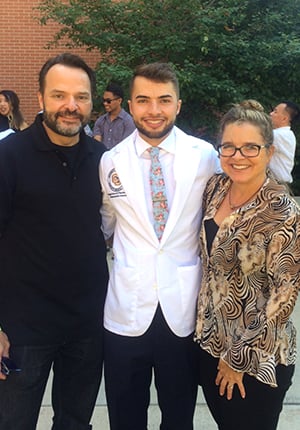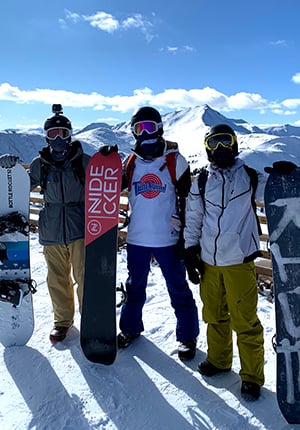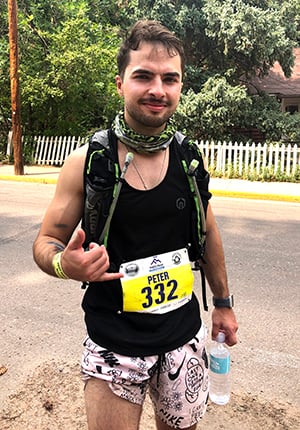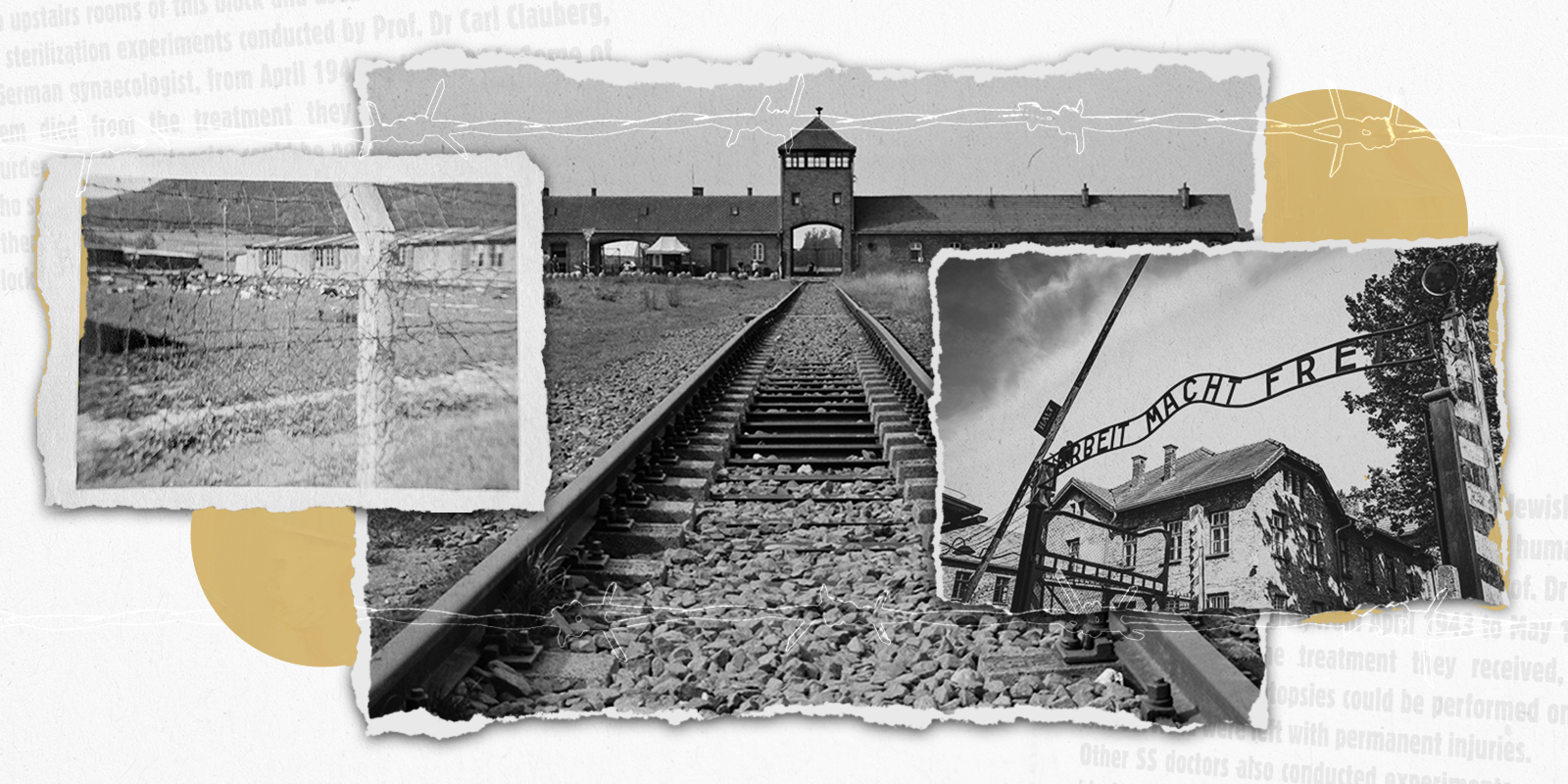Like many of the “A-ha!” moments that have sparked human innovation throughout history, a setback catalyzed one of the most meaningful discoveries of Peter Tonsits’ life.
“I’m a huge sports person,” says Tonsits, an avid athlete and sports fan who played competitive soccer throughout his childhood – until high school, when a hip injury and multiple surgeries sidelined him for good. “I was planning on playing college soccer, so when I got knocked out of the sport, I felt like I lost my identity.”
 Peter Tonsits with his parents at the white coat ceremony during his first year of pharmacy school. |
Tonsits picked up a part-time job at Costco, but his hips weren’t healthy enough for him to push trains of shopping carts or perform other strenuous aspects of the job. When a clerk position opened in the Costco pharmacy, he transitioned to ringing people up for their prescriptions. “When I started working there, it just clicked,” Tonsits recalls. “I’ve always been interested in the human body, and I knew I wanted to get into the medical profession, but I don’t do well with blood.” He laughs. “So that eliminates a lot of things right off the bat. But then I wound up working in healthcare at Costco, and I really enjoyed it.”
‘I knew exactly what I wanted to do’
With sports and physically demanding work off the table, Tonists dumped his athletic gear and went all in on pursuing his burgeoning interest in pharmacology. “I knew exactly what I wanted to do,” said the Colorado native, who attended Pikes Peak Community College before transferring to the University of Colorado Colorado Springs to complete his undergrad. His extensive research of pharmacy schools led him to the top-ranked University of Colorado Skaggs School of Pharmacy and Pharmaceutical Sciences. He was so certain where he wanted to earn his degree, Skaggs was the only application he filed.
Throughout undergrad and his gap year, Tonsits continued working at the Costco Pharmacy (where he still works today) and picked up a second job at a UCHealth pharmacy in Colorado Springs. “I had exposure to both the community and hospital pharmacy environments prior to going into pharmacy school,” he notes, “which made learning at CU easier because I had already been exposed to so much. Then I was able to learn in the classroom, and I continued working at both of those places while I was in school.”
Advocating for change
Tonsits furthered his pharmaceutical education and experience through a rotation at the American Society of Health System Pharmacists (ASHP), a highly competitive Advanced Pharmacy Practice Experience, six of which are required to earn a Doctorate of Pharmacy (PharmD) at CU Anschutz.

Tonsits, far right, snowboarding with a couple fellow pharmacy school students. |
Based in Washington D.C., ASHP is a policy group working to advance the professional practice of pharmacists in myriad healthcare settings across the industry, which exposed Tonsits – who was assigned to the government affairs team – to the advocacy side of the profession. “I really liked that experience, and learning how AHSP is working to progress the pharmacy profession,” says Tonsits, who created a COVID-19 vaccine guide for pharmacy personnel for the ASHP website as part of his rotation. “One thing I've learned going through my pharmacy program is that pharmacists are very overqualified and under-utilized in comparison to the responsibilities we are given and what we are allowed to do in actual practice.
“Historically, pharmacists have been seen as pill dispensers, and that is what most people still think of when they think of a pharmacist today, yet our training consists of extensive education in diagnosis, disease management, drug selection and many other areas,” Tonsits observes, pointing to the progression of pharmacy education and training from what was once a four-year undergraduate degree to eight years of schooling at the doctorate level and typically one to two years of residency. “Essentially, we are trained as more of a hybrid between a classical pharmacist and a medical doctor.”
Although the COVID-19 pandemic prevented him from doing his D.C. internship as planned, Tonsits’ remote rotation with ASHP “was 100% my favorite rotation because I got to talk with the CEO, the CFO and pretty much everyone in senior leadership. I met all of these amazing people, and I took a lot away from it.”
Exploring the industry side
Not surprisingly, Tonsits knows exactly where he’s headed next: a two-year fellowship in the business and manufacturing side of pharmaceutical sciences at Sanofi, in conjunction with Rutgers University, where he’ll train as a medical science liaison working with researchers and medical practitioners.
“I’m looking forward to challenging myself in a sector of pharmacy that is new for me,” he says. “There's so much in this fellowship for me to gain and to grow as a person, and I'm going to bring all of my experiences from hospital pharmacy and community pharmacy to it.”
A worthwhile commute
For Tonsits, studying pharmacy in his home state, for “reasonably priced tuition,” weren’t the only advantages of his CU Anschutz education.

Tonsits after finishing the Pikes Peak Marathon in August 2020. |
“One of the things I really appreciate is the diversity here,” says Tonsits, who commuted to the CU Anschutz Medical Campus from Colorado Springs every day for a year and a half before moving to Denver. “The Colorado Springs community I was living in is not very diverse, and I wasn’t exposed to a lot of different cultures or people from different backgrounds. At CU Anschutz, there are people from every different walk of life, every different culture.”
Tonsits also appreciates the small class size and esteemed faculty at Skaggs School of Pharmacy. “I've relished being taught by high-caliber professors who are doing high-level research, publishing manuscripts and are renowned around the nation,” he says. “I feel like I know everyone in my class on a pretty decent level, and then there's the people you spend hours studying in the library with and get to know very well. I've really enjoyed that, too.”
An unexpected side effect
As Tonsits flourished in the Skaggs PharmD program, his perspective and attitude about his physicality shifted. “I was pretty much done with all physical activity for about seven years. I thought there were all of these things I couldn’t do, or shouldn’t do, because of my hips,” he muses. “But I think if you're doing well in something, it bleeds into other aspects of your life.
“I was 100% committed to doing well in pharmacy school, and I felt like I excelled from day one,” he says with an infectious enthusiasm. “I slowly started working out, and then running. Over time I got healthier, stronger and continued to gain confidence. I did a half marathon and a full marathon while I was at CU.”
The physically renewed PharmD grad has also taken up jujitsu and snowboarding, and he’s even playing soccer again. “Working through that mental block was a big step for me,” he says. “Now I don’t even think about it at all, and everything is free game.”
|
Envisioning a Pharma Evolution
“There is a huge, growing gap in healthcare regarding the management of deadly chronic diseases that pharmacists have the training, man-power and presence to tackle if we are given the power to do so,” Peter Tonsits believes.
In his vision for the future of pharmacy, “pharmacists would have prescribing status and take on a larger role in managing chronic issues,” Tonsits says. “We (pharmacists) are extremely good at helping people manage chronic disease states like diabetes, hypertension, hypercholesterolemia, etc. We are also one of the most accessible healthcare providers, as most Americans live within two miles of a pharmacy.
“Unfortunately, the United States is facing a physician shortage and we don’t have enough physicians to handle the number of patients in need of chronic disease management,” he continues. “This is the void pharmacists can fill if we are given prescriber status and the profession continues to evolve into being more of a provider, rather than just a drug dispenser. The pharmacy industry is also pretty saturated, so we have a surplus of pharmacists who could immediately step into these roles.” |



